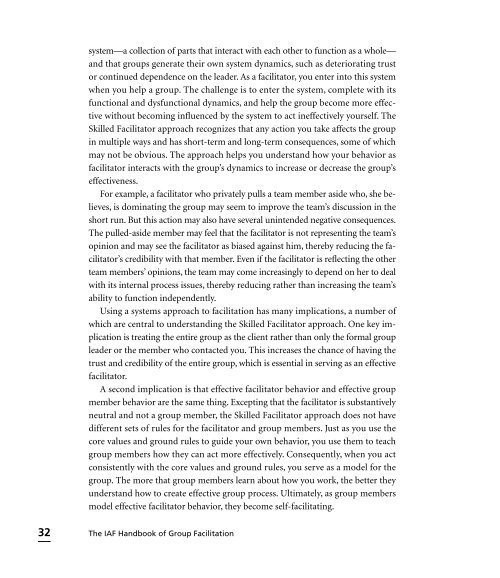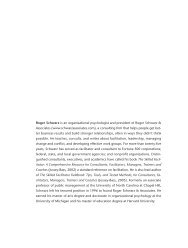The Skilled Facilitator Approach - Roger Schwarz
The Skilled Facilitator Approach - Roger Schwarz
The Skilled Facilitator Approach - Roger Schwarz
Create successful ePaper yourself
Turn your PDF publications into a flip-book with our unique Google optimized e-Paper software.
32<br />
system—a collection of parts that interact with each other to function as a whole—<br />
and that groups generate their own system dynamics, such as deteriorating trust<br />
or continued dependence on the leader. As a facilitator, you enter into this system<br />
when you help a group. <strong>The</strong> challenge is to enter the system, complete with its<br />
functional and dysfunctional dynamics, and help the group become more effective<br />
without becoming influenced by the system to act ineffectively yourself. <strong>The</strong><br />
<strong>Skilled</strong> <strong>Facilitator</strong> approach recognizes that any action you take affects the group<br />
in multiple ways and has short-term and long-term consequences, some of which<br />
may not be obvious. <strong>The</strong> approach helps you understand how your behavior as<br />
facilitator interacts with the group’s dynamics to increase or decrease the group’s<br />
effectiveness.<br />
For example, a facilitator who privately pulls a team member aside who, she believes,<br />
is dominating the group may seem to improve the team’s discussion in the<br />
short run. But this action may also have several unintended negative consequences.<br />
<strong>The</strong> pulled-aside member may feel that the facilitator is not representing the team’s<br />
opinion and may see the facilitator as biased against him, thereby reducing the facilitator’s<br />
credibility with that member. Even if the facilitator is reflecting the other<br />
team members’ opinions, the team may come increasingly to depend on her to deal<br />
with its internal process issues, thereby reducing rather than increasing the team’s<br />
ability to function independently.<br />
Using a systems approach to facilitation has many implications, a number of<br />
which are central to understanding the <strong>Skilled</strong> <strong>Facilitator</strong> approach. One key implication<br />
is treating the entire group as the client rather than only the formal group<br />
leader or the member who contacted you. This increases the chance of having the<br />
trust and credibility of the entire group, which is essential in serving as an effective<br />
facilitator.<br />
A second implication is that effective facilitator behavior and effective group<br />
member behavior are the same thing. Excepting that the facilitator is substantively<br />
neutral and not a group member, the <strong>Skilled</strong> <strong>Facilitator</strong> approach does not have<br />
different sets of rules for the facilitator and group members. Just as you use the<br />
core values and ground rules to guide your own behavior, you use them to teach<br />
group members how they can act more effectively. Consequently, when you act<br />
consistently with the core values and ground rules, you serve as a model for the<br />
group. <strong>The</strong> more that group members learn about how you work, the better they<br />
understand how to create effective group process. Ultimately, as group members<br />
model effective facilitator behavior, they become self-facilitating.<br />
<strong>The</strong> IAF Handbook of Group Facilitation



